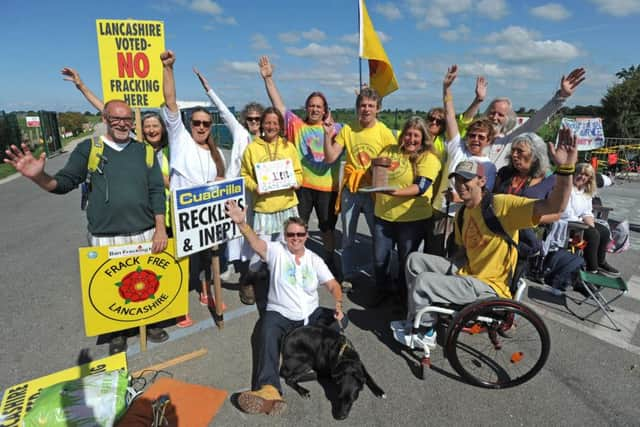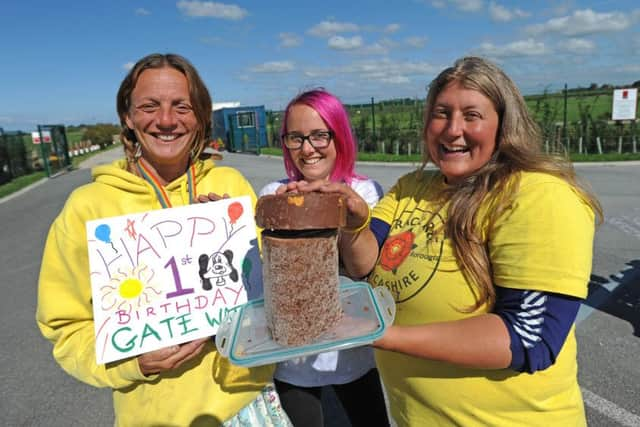Anti-fracking campaigners remain steadfast one year on as Cuadrilla defends its plans to drill on the site
and live on Freeview channel 276
Wednesday marked one year since the roadside meeting point was set up at the gates of the fracking site on Preston New Road with the aim of monitoring everything that goes in and out of the site, come rain or shine.
Protesters celebrated the anniversary with promises to remain steadfast until their goal of putting an end to fracking is met. But pro-frackers insist the work will go ahead, and that people needed to accept the government’s decision to allow oil and gas company Cuadrilla drill Lancashire.
Advertisement
Hide AdAdvertisement
Hide AdReporter Wes Holmes spoke to those both for and against the practice.


THE ACTIVISTS:
Katrina Lawrie, an anti-fracking protester from Wigan, is one of many environmental activists taking shifts of up to 12 hours at the outpost.
She said: “Most of the time it’s a very friendly place. We have been there logging everything 24 hours a day for the past year. Everything is written down, from the number of vehicles to the number of pipes going in and out.
“We log companies and registration plates of the haulage vehicles so we can peacefully contact them asking them to reconsider their contracts.”


Advertisement
Hide AdAdvertisement
Hide AdShe said a number of haulage companies, including Eddie Stobart, had agreed to cease deliveries to the site upon their request.
“I do believe that it’s one of the most watched and monitored fracking sites, and that has been a source of great pride to everyone who has contributed over the past year and beyond,” she said. “It has been a life-changing experience.
“It can be a challenge, especially in winter. Most of us have done night shifts.
“From time to time there’s a person who drives past and shouts the odd insult, but the vast majority of interactions we have are very positive and we try to take heart from that.”
Advertisement
Hide AdAdvertisement
Hide AdClaire Stephenson, of Frack Free Lancashire, added: “It has been a massive commitment for people. I don’t think anybody is willing to give it up. People have made lifestyle changes
“It’s now a national conversation. I feel as though we are getting a lot more support from a higher level. Politicians have been in touch offering their help and support.
“The 2014 Public Health England report on shale gas was very limited, and since then there has been more than 1,000 studies on fracking, and yet they are not updating it.
“We are sitting on the most fractured geology in the UK, which is what David Smythe (professor of geophysics in the University of Glasgow) said when he represented us for Lancashire County Council. The UK is wholly unsuitable for onshore fracking.”
Advertisement
Hide AdAdvertisement
Hide AdHer fears are currently supported by environmental organisation Greenpeace, which warned that fracking could result in water pollution and contribute to climate change. It also argued that the impact fracking would have on energy bills would be ‘basically insignificant’, though pro-frackers say the work would combat potential price hikes and improve the local economy.
Ms Stephenson said: “People in London don’t know much about fracking, and why should they? It isn’t being forced on their doorstep. I don’t think they would have got as far in the South because of public outcry. I don’t think politicians would be as adamant about fracking in southern areas as the North.
“I think one way or another we will win. Either Cuadrilla will find out this isn’t financially viable or there will be some fault found that will shut the industry down.”
Ms Lawrie added: “We really feel like we are making a difference. In the face of something that we consider so bad, the friendships that so many of us have forged have been beautiful and positive.”
THE PRO-FRACKERS’ VIEWS:
Advertisement
Hide AdAdvertisement
Hide AdLee Petts, of Lancashire For Shale, said it was ‘right and proper’ that people were able to voice their opinions on fracking - but added: “It’s hard to understand what campaigners think they can now achieve, and why they feel justified in continuing their fight.
“Surely there comes a point at which people need to accept that shale gas exploration is going ahead, even if they still oppose it, and perhaps start to think about how they can ensure that local communities and businesses benefit from it the most?”
Lancashire County Council rejected Cuadrilla’s bid to commence fracking in the Fylde in 2016 - but the decision was overturned by Secretary of State Sajid Javid.
His decision was challenged twice in court, but was upheld.
And in June, Cuadrilla successfully obtained a new high court injuction against all campaigners who opposed drilling operations on Preston New Road.
Advertisement
Hide AdAdvertisement
Hide AdA Cuadrilla spokesman said the company ‘would not hesitate’ to take legal action against protesters who breached the injuction and disrupted its suppliers.
Meanwhile, The Environment Agency ‘ensures that any shale gas operations are conducted in a way that protects people and the environment’, according to the Department for Business, Energy and Industrial Strategy.
Its permitting regulations include protecting water resources, including groundwater, appropriate treatment and disposal of mining waste produced during fracking, suitable treatment and management of any naturally occurring radioactive materials, and the disposal of waste gases.
The Environment Agency and the Health and Safety Executive will also meet with all new shale providers to advise them and carry out inspections. Mr Petts said: “It is clear from this that there is no reason not to allow it to proceed – were there were any substance to the claims about safety and environmental fears, Cuadrilla simply would not have obtained all the permissions it now has.
Advertisement
Hide AdAdvertisement
Hide Ad“As a nation, we are over-reliant on imports for the gas we use, and, as we saw during the ‘Beast from the East’ winter storms, those imports can’t always be relied upon – pipelines develop unexpected faults, planned maintenance activities overrun, and supplies end up being constrained as a result.
“We have a lack of gas storage too nowadays, which exacerbates the problem.
“There is a pressing need to see if Lancashire shale gas can one day help to displace some of those imports and make our energy systems more secure and resilient.
“Then there are the opportunities, jobs and investment that could flow from a successful shale gas industry.
Advertisement
Hide AdAdvertisement
Hide Ad“For instance, Cuadrilla and its suppliers are already responsible for over £10 million of local spend, and that’s just from constructing the Preston New Road site and drilling two wells.
“But in order to fully understand the potential and then realise it, we first need to see Cuadrilla get on with proving that the gas can be extracted in commercial quantities, which is why it’s so important for its current program to continue.”
He added that water pollution fears in the Fylde were unfounded.
“Most of Fylde’s drinking water comes from Stocks Reservoir in the Ribble Valley and Haweswater in the Lake District.
Advertisement
Hide AdAdvertisement
Hide Ad“A smaller amount is groundwater abstracted near Garstang, but that’s to the east of the Woodsfold Fault.
“Groundwater from beneath the Fylde, to the west of the Woodsfold Fault, is not used for drinking water purposes because it is too salty,” he said.